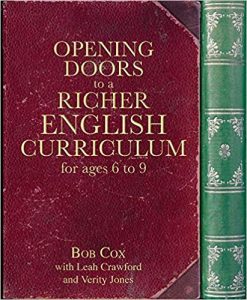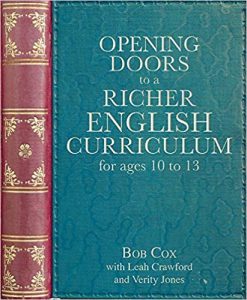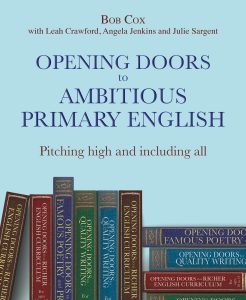



# 1 The story of the first Opening Doors Hubs 2022-3
Or the power of principled, collaborative, guided CPD on teaching writing
The Opening Doors approach to ambitious English with access for all pupils was the brain-child of education consultant, presenter and author, Bob Cox. Opening Doors was given life in book form first in 2014 and is now embodied in a suite of five books that exemplify richer English in over 40 learning journeys, as well as a team of 5 consultants who work nationally and internationally to support teachers and leaders through continuing professional development.
This is a story of what can happen when schools begin to own and embody a high pitch, low access, principled approach to teaching and wish to share and explore this with other local schools. It is a story of improving the language, thinking and skills of young writers and of re-establishing an effective and ethical approach to teachers’ CPD after Covid lockdowns.
We will start not from the beginning of the story – but where we find ourselves now in Spring 2023.
Opening Doors Hubs: in partnership with schools
Four groups of teachers have been meeting at schools with established effective ‘Opening Doors’ practice over four or five meetings through this academic year. As an Opening Doors author and consultant, I have facilitated these training hubs in partnership with teachers and leaders in the schools. I have simulated teaching units with participating teachers and reflected upon the principles that underpin them. We have been in classrooms observing and reflecting upon live lessons. We have been visited in the training room by pupils who have talked, with astonishing metacognitive awareness, through the writing journeys and outcomes in their books. Teachers have been encouraged to trial existing Opening Doors units from our suite of publications and many have been supported to create their own units around new, challenging tapestries of texts.
In the final meeting, we conducted a formative moderation of pupils’ writing outcomes using the STA end of Key Stage Teacher Assessment Framework (TAF) for writing. Meeting or evidencing the TAF statements had never been our goal – but we remained cognizant of the statements therein as we journeyed through the year. The goal of these hubs was to develop the language, thinking, confidence and competence of teachers and students in the writing classroom. The goal was for pupils to feel that writing was challenging, interesting, and something they were tangibly getting better at.
Evaluation of the course was captured through ongoing discussion and an anonymised evaluation form.
100% of participants agreed or strongly agreed that:
-
The course had deepened their knowledge and understanding of teaching writing
-
The quality of their teaching of writing had improved
-
There had been a tangible impact of this on pupils’ learning and outcomes
-
The texts and quality of materials were an important aspect of the course
So what had made the difference? Participants were encouraged to explain their scaled responses. I’m going to start with an extended written response from a teacher, Liz, who was unable to attend the final session, but took the time to write at some length:
When I took the first unit back to the classroom, I was sceptical about the standard some of the weaker writers in my Year 5-6 mixed class could reach. I therefore chose the first unit as Wind, a poem centred on personification of the voice of the wind by Dionne Brand which was from the lower age 6-9 book, Opening Doors to a Richer English Curriculum. The talk around the poem was great. The results from writing were reasonable.
However, when I stepped up the difficulty to the Ted Hughes poem, also called Wind, but which personifies all aspects of a landscape under attack by a sublimely powerful wind – suddenly ALL writers were engaged. They loved the fact that phrases could mean different things to different people and the standard of their writing was boosted enormously.
I continued using the Opening Doors unit within prose: the Hound of the Baskerville unit, ‘Hell-hound’ produced some intensely gripping writing from my children and likewise the First Man on the Moon by HG Wells allowed them to create awe inspiring writing. All of these ideas I gained from discussions with Leah and my other Year 6 colleagues on this course. I have tried to adapt my practices to use radial questions in other ways to get deeper analysis of writing in other contexts.
Liz’s story encapsulates many of the threads represented in the further teacher evaluations below. Expertise and confidence is built through effort, strategy, and a degree of risk taking. It is teachers who can create access to texts that challenge and inspire all children. Children have the capacity to constantly surprise us as to the challenge they can embrace when it is carefully managed and rendered collaborative. Children are most inspired to think and create when the challenge hits the sweet spot: ‘This is new – this is something we have not done before – this is opening up new horizons – I think we can do it…and to have a go at this is exciting.’
Below are further representative comments from the 4 groups of teachers:
-
Aiming high and working in mixed ability groups where everyone has a voice has really improved everyone’s writing – especially those that have struggled in the past.
-
All children have been able to access greater depth texts but haven’t been overwhelmed. Vocabulary choices have really improved.
-
The course has deepened my understanding of what can be achieved and what is needed at the end of KS2. It has built on sessions we have had as a single school.
-
The course has helped to solidify my understanding of what the writing curriculum is for and what we are looking for pupils to achieve. It deepened my view of the way that rich texts can inspire children to produce writing that is effective and coherent but also inspired and purposeful. (KS1 teacher)
-
I have loved learning over the past 4 sessions. It is just what we have needed post Covid. I have learned so much and have been buzzing with ideas. The impact on children and staff has been huge.
-
High quality texts = high progress: developing word choice, and comprehension. This approach encourages creativity, not just development of skills.
-
High quality teaching units were broken down into manageable steps – a learning journey.
-
There was visible impact on children’s writing through the delivery of the shared units.
-
Trialling new approaches has been hard work but very rewarding.
-
The course gave me the confidence to use much more challenging texts. Seeing live teaching and having children explain and share their writing journeys was powerful.
Finally, I asked teachers: What would you say to another school/teacher thinking of joining the course next year?
-
The course will change your mindset about what children can access and can transform their writing.
-
Opening Doors = opening teachers’ minds
-
Go for it – it’s a very different way of teaching but really does reap rewards. The children love working this way
-
Very worthwhile and good to talk to other teachers from different schools
-
Be open to shift your thinking – the outcomes will speak for themselves
-
Progress is instant, children and teachers are more engaged and more passionate about teaching different topics
-
Balance is crucial: provide rich texts with purposeful creative activities and skill based opportunities
-
The course opens doors to new ways of thinking and makes you realise children have got the ability and skills to tackle these more challenging texts.
-
Do it!
-
I would 100% recommend this course: it has built my confidence for planning and teaching English
-
I highly recommend this course to anyone, it has greatly benefited my teaching
-
This is high quality CPD that makes a huge impact on children’s writing and ensures high expectations for all
So that’s where we are now in April 2023. Each of these Hub schools plans to offer further courses in the 2023-4 academic year, and 3 further schools who have worked hard on Opening Doors approaches this year, will also advertise Opening Doors Hub courses in partnership with me for the coming year.
If you are intrigued to know more about Opening Doors, you can…
-
Access our existing 5 books each containing 15 teaching units that exemplify an approach to rich English with access for all.
-
Pre-order our new book: Opening Doors to an Ambitious Primary English Curriculum – an umbrella guide to underpinning principles and the classroom strategies that can bring them to life.
-
Get in touch – the Opening Doors team has a wide range of experience spanning all aspects of English and all Key Stages. If you teach in or border Hampshire, there may be an Opening Doors Hub course you can access in person in 2023-4
-
Peruse the home of Opening Doors on Bob Cox’s website here
-
Sign up for a free space on our new book launch webinar on 3rd May here, kindly hosted by the Oxfordshire Teaching School Alliance


